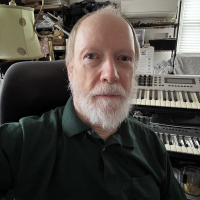Loopy Pro: Create music, your way.
What is Loopy Pro? — Loopy Pro is a powerful, flexible, and intuitive live looper, sampler, clip launcher and DAW for iPhone and iPad. At its core, it allows you to record and layer sounds in real-time to create complex musical arrangements. But it doesn’t stop there—Loopy Pro offers advanced tools to customize your workflow, build dynamic performance setups, and create a seamless connection between instruments, effects, and external gear.
Use it for live looping, sequencing, arranging, mixing, and much more. Whether you're a live performer, a producer, or just experimenting with sound, Loopy Pro helps you take control of your creative process.
Download on the App StoreLoopy Pro is your all-in-one musical toolkit. Try it for free today.
The Wake (Bome Network, Solo, Omnisphere)
This is a music track that I improvised on two MIDI keyboards connected to an iPad.
I used Bome Network software to send the iPad's MIDI notes to Bitwig Studio running on a desktop PC. There the MIDI was routed to Solo for the bassoon and violin, as well as to Omnisphere for the background instrument.
After bringing the audio recording into Vegas Pro, I applied the Lurssen Mastering Console plug-in to the audio mix.
It's titled The Wake.




Comments
Soft subtle moody atmosphere. Another great piece of music.
Lovely sounds, it’s great how such a slow piece of music can still keep your attention right to the end 👍
Thanks, @jo92346 and @GeoTony. Much appreciated.
That's the conundrum I've been wrestling with. How do you make them slow and deliberate, but still musically interesting?
Reminiscent in some sections of Dvorak’s New World Symphony. Also got a kind of Gorecki thing going on… the results are beautiful. I don’t know if you consider you have solved the conundrum of slow and interesting but it sure works for me! Beautiful visuals too.
Beautiful visuals too.
Thanks, @Svetlovska. Much appreciated.
I don't know if the conundrum can ever be completely solved. Bitwig Studio makes it easy to stretch out a MIDI track, so I'm able to slow things down to a better tempo (after the fact). I've tried improvising it more slowly, but improvising seems to work best when you're not consciously trying to do something beyond the notes and quality of sound.
Someday, I would hope to achieve just a fraction of the slow, yet serene quality in the quieter movements of Mahler's symphonies. Something musically interesting that just seems to hang in the air, like a cloud.
I'm late to this one but wanted to comment. How lovely. I tried 'slow' a while back and found it really hard.
Giving space to a melody or accompaniment is harder than it sounds, and paradoxically, by leaving more room for expression I found that the tolerances seemed to shrink and I was holding notes a little too much, or not enough, etc...
This piece feels beautifully expressive and balanced though with lovely instrumentation too.
Excellent. One of your best .IMHO. Beautiful video as well.
I’ve worked with slow a lot in my training as an improviser. I especially worked on slow scales, separate and in contrary motion. One up and down melodic minor scale over two octaves could take me five minutes or more. There was a lot of attention to slow breathing and abdominal relaxation.
The sound faded out. I still held on. The feeling of depressing and releasing each piano key was palpable. Not sure how you would apply this to composing but you said you were improvising.
I studied tai chi chuan at the same time as improvising (age 25). My teacher, Wolf Lowenthal, walked so slowly I could not keep up with him as we walked to the Cuban Chinese restaurant after class. This short form was introduced by Prof. Cheng Man-Ch’ing (my teacher’s teacher) to the US in the late 60s. It took 5-8 minutes to perform. I once led a class of another teacher’s school in downtown Manhattan. That 7 minute form lasted almost an hour as I recall. My teacher chuckled. I couldn’t do that now. No way. But I think I can still play real slow. You seemed to have no problem.
Thanks, @jo92346, @GeoTony, @Svetlovska, @belldu, and @LinearLineman. Much appreciated.
I had my wife in mind, especially for this one. She passed away yesterday morning, after a long bout with Alzheimer's.
@DavidEnglish : oh, David! I am so so sorry. Words from strangers are useless at such times, but know that you are in my thoughts.
@DavidEnglish I'm speechless. So sorry and sad for you :-(
@DavidEnglish, I listened to this lovely piece again just now.
So sorry for your loss.
You honour your wife with your music.
Very sad news David, such a terrible disease, wishing you all the very best 🙏
Thanks for your kind words and support, @Svetlovska, @jo92346, @belldu, @GeoTony, and @LinearLineman (who I have been communicating with privately).
The diagnosis was in 2018, though you're never quite ready for the end of it.